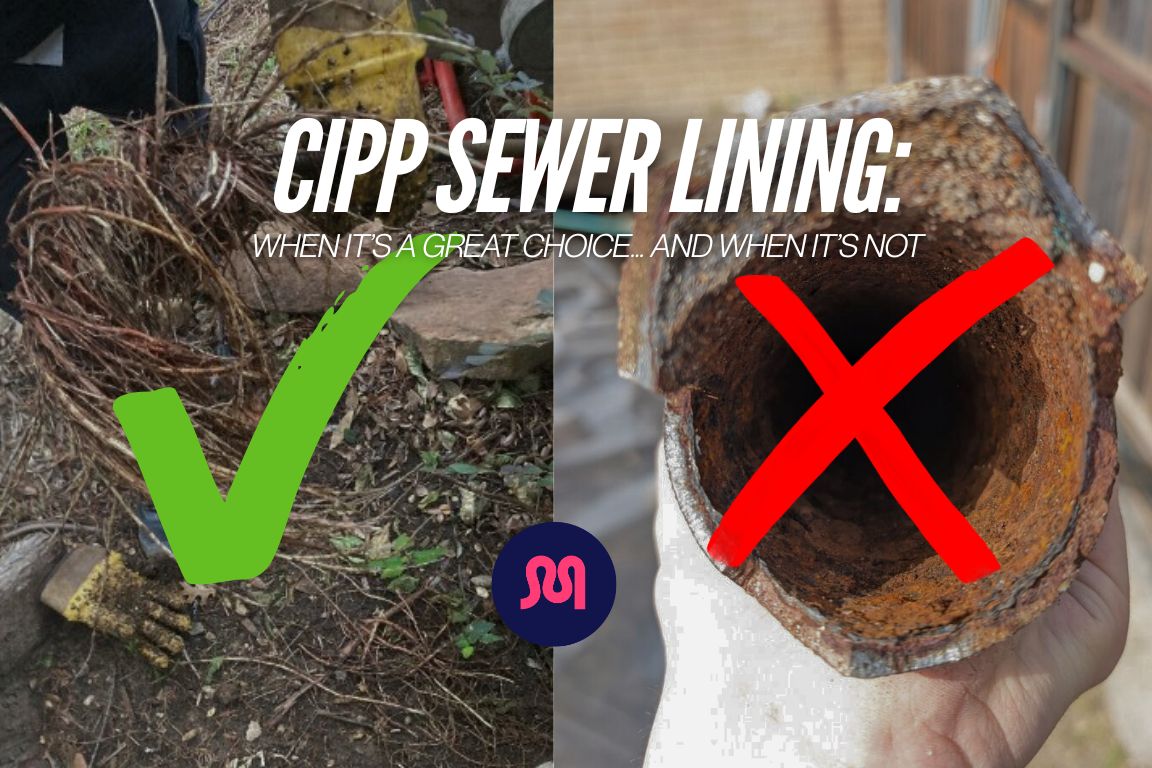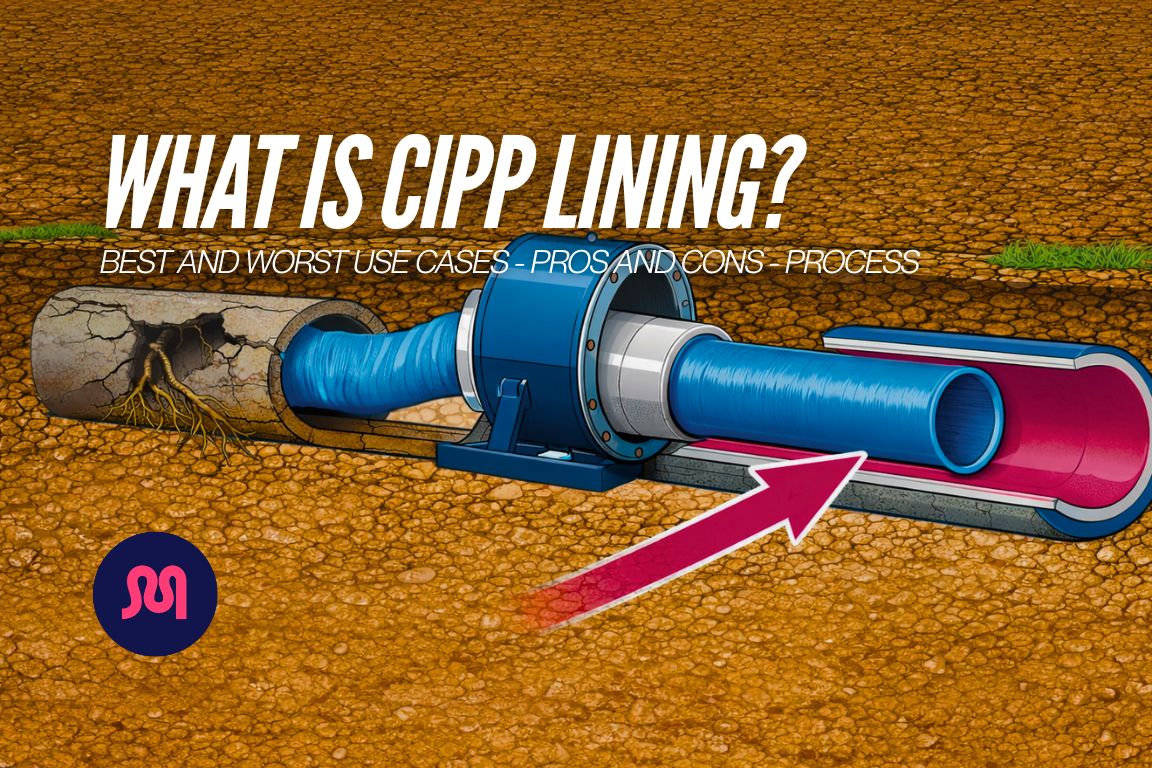Fast Plumbing Answers: Is Hard Water Ruining Your Laundry?
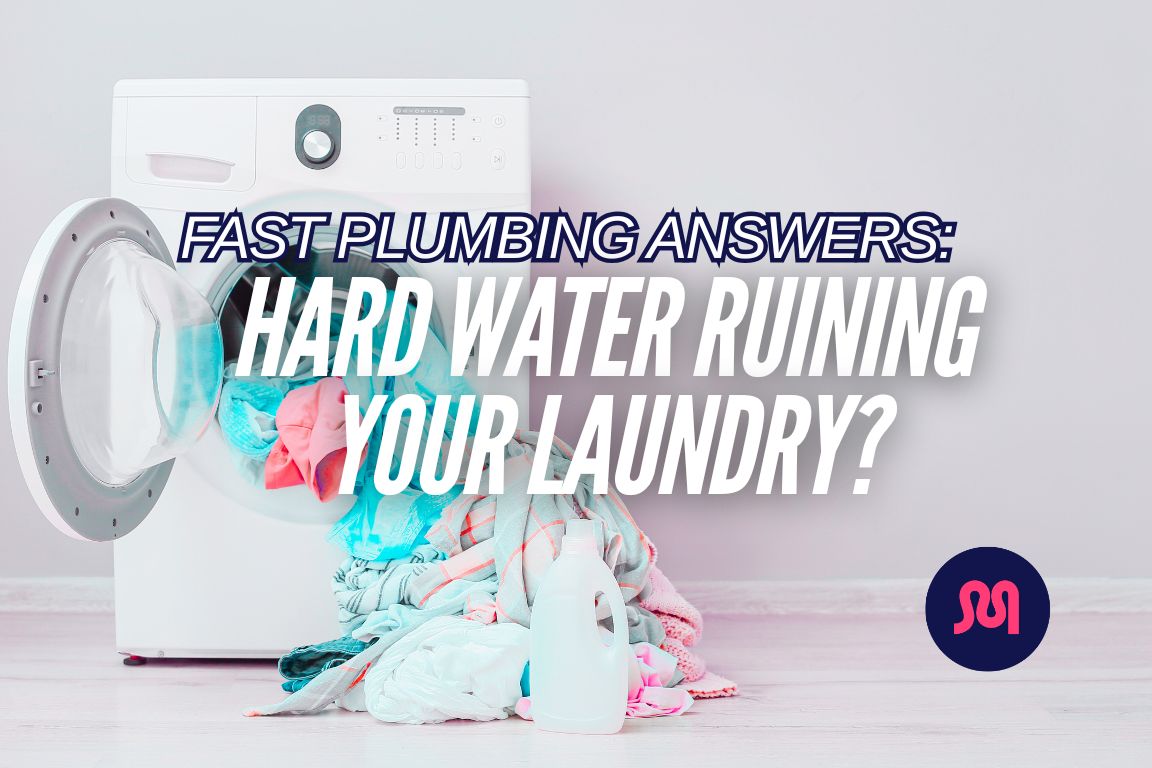
table of contents
table of contents
We hear it from our customers in Dallas all the time: hard water is wrecking their laundry. “My towels feel like sandpaper,” one told us. Dingy whites, faded colors, rough bedding- the list of complaints goes on.
And they’re right: the minerals in hard water take a toll on your laundry in more ways than one. They damage fabric, make detergent less effective, and screw up your washing machine.
Don’t worry: we’ve got short-term and long-term answers for you in 3 minutes.
We’re Mother, a modern plumbing service focused on solutions to your real-world problems. We’ll give you the DIY “white vinegar trick” that improves laundry fast- then, we’ll show you the two best water softening products that get hard water out of the wash for good.
Want softer water in Dallas? Call Mother 24/7- we’ll find the right solution for your home.
{{whole-home-water-softener-installation="/services/whole-home-water-softener-installation"}}
The Problem: Hard Water Damages Your Laundry
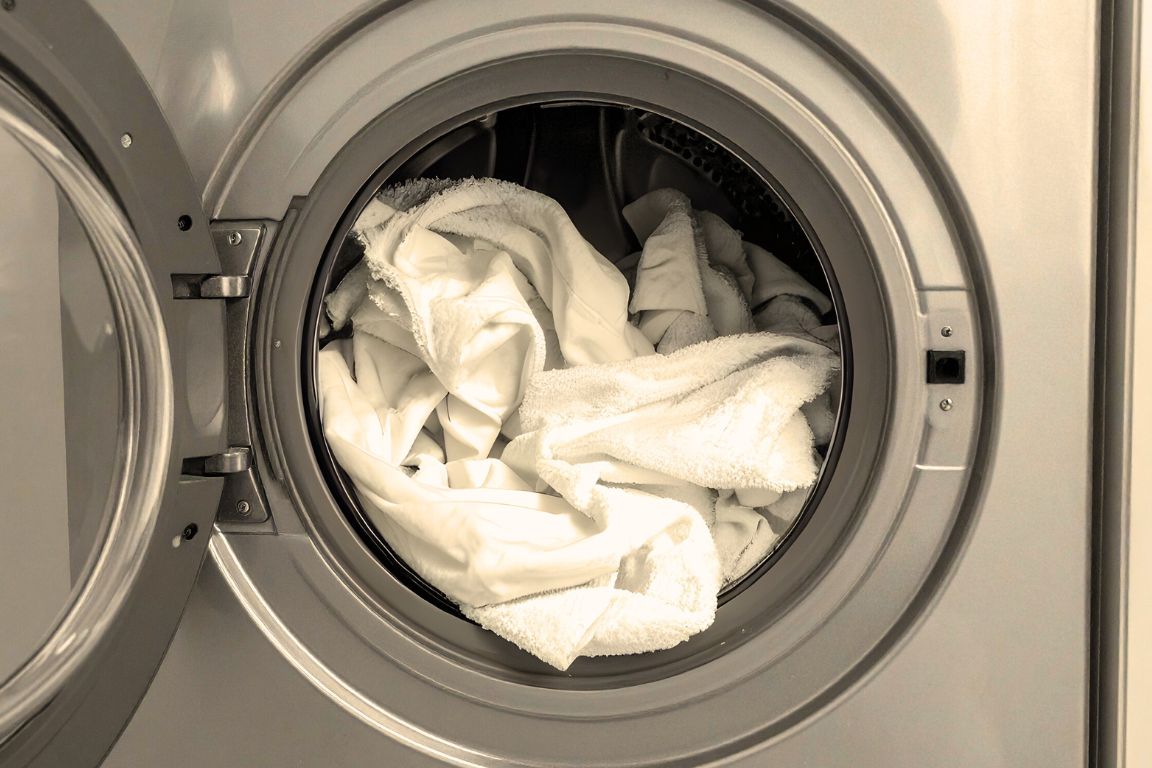
Many homeowners don’t worry much about hard water until it’s caused damage. “It has calcium in it,” one plumbing customer told us. “That’s supposed to be healthy!”
But the same calcium that’s great for your teeth and bones is pretty rotten for your laundry. The minerals in hard water (calcium, magnesium, and limescale) leave residue on your clothes and reduce how well laundry soap cleans your fabrics.
(Not to mention the number they do on your washing machine itself!)
We could have our plumbers list all the scientific reasons hard water ruins your laundry- but that’s a little dull. It’s much more relevant to see what people who live in hard water areas say about their laundry.
What homeowners tell us about hard water and their clothes
We asked our customers for feedback about the damage hard water causes to their clothes and household items in the washing machine. Here are their four biggest complaints:
- Whites turn dingy and gray. After 10-15 washes in hard water, mineral deposits on your clothes make those white linens look “off-white” at best.
- Rough, scratchy fabric. Those ultra-soft bath towels you bought are starting to scratch your skin- that’s a sure sign of calcium deposits on fabric fibers.
- Faded colors. Hard water residue makes bright colored fabric fade faster than usual.
- Locked-in smells. Some homeowners say their clothes just don’t “smell clean”. Calcium and magnesium make it harder for detergent to lift odors from clothes.
3 Ways Hard Water Ruins Your Clothes in the Wash
The minerals in hard water do more than just leave your clothing dingy and gray. They’re also detrimental to the soap that cleans your clothes, and damage your washing machine itself.
Here are the three unique ways that hard water makes your clothes less clean:
- Mineral deposits on fabric. In particular, calcium deposits cause fabric to become rougher, drier and tear more easily. They also make bright colors dingy, and add a gray or white tint to your white clothes.
- Detergent hates hard water. Hard water directly interferes with your detergent’s ability to clean clothes. Its minerals bind with the soap, limiting its ability to remove stains, smells and dirt from clothing, sheets and towels.
- Scaling in the washing machine. Limescale buildup shortens the lifespan of your washing machine. In the short-term, it also damages your washer hoses, heating elements, and internal mechanical components of the machine.
Short-Term Fix: Add Vinegar to Your Rinse Cycle
A popular DIY fix for hard water in the laundry that actually works is adding vinegar to the rinse cycle.
To perform the DIY “white vinegar trick”, you’ll need distilled white vinegar. Look for distilled white vinegar with 5% acidity- use ½ cup for a normal load of laundry. For max loads or heavy fabrics (bath towels), increase to ¾-1 cup.
Do not use “cleaning vinegar”- its 6%+ acidity is too strong for fabrics and can damage the rubber parts in your washing machine.
Pour the distilled white vinegar directly into the fabric softener dispenser on your washing machine. It will release at the appropriate time- during the final rinse cycle.
How distilled white vinegar fights hard water in the wash
It’s the perfect blend of “enough acid to combat minerals, but not enough acid to damage your clothes and linens”.
Here’s how the natural properties of distilled white vinegar work in the rinse cycle:
The vinegar dissolves the mineral deposits on your laundry. This allows any detergent and soap scum trapped underneath to get out. This leaves your clothes, linens and towels smelling fresher, looking brighter and feeling softer.
This process isn’t failsafe, and it doesn’t combat the long-term effects of mineral scaling on your laundry or your washing machine. But it’s great in a pinch for homeowners who live in regions affected by hard water- you should see some improvement.
“Forever” Fix: Water Softener for Your Washing Machine
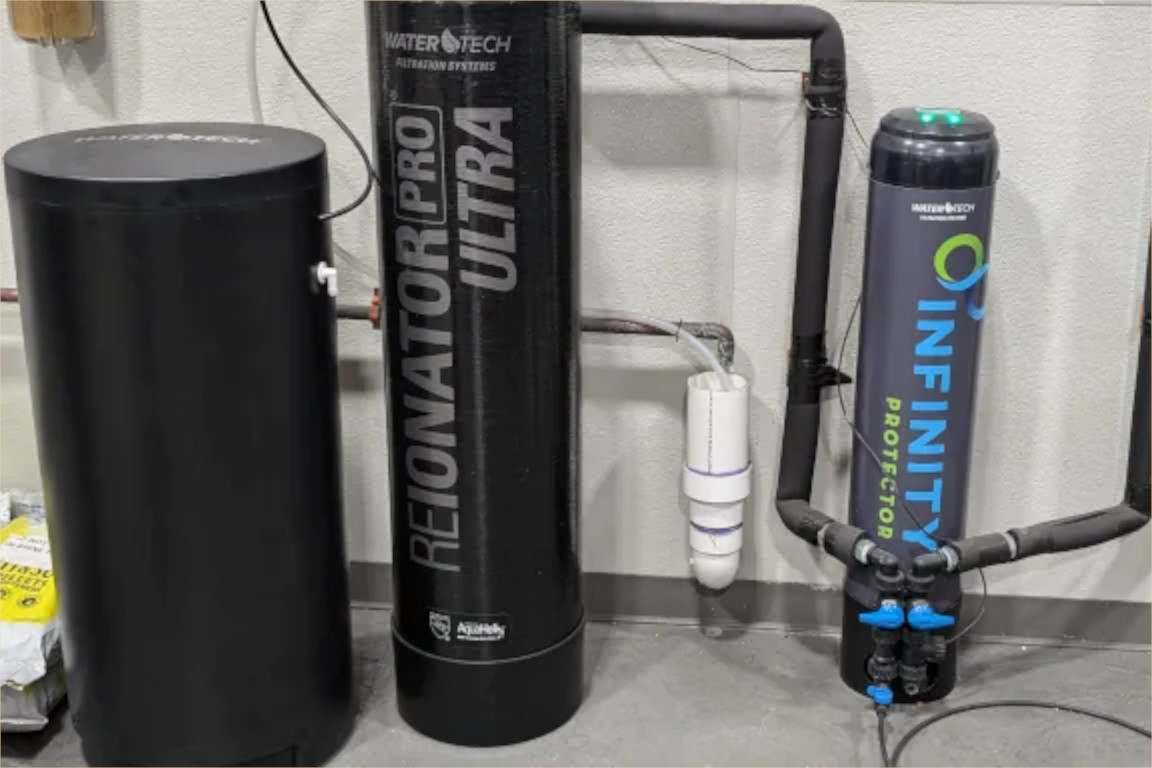
If you want a permanent solution to hard water damaging your laundry, our plumbers agree a water softening system is the best choice- and you have two great options!
Choose an inline water softener, which attaches to the back of your washing machine to improve your laundry. Or install a whole home softening system to reduce hard water issues throughout your house.
Let’s look at both options, and real-world scenarios where they succeed.
Inline water softeners for your washing machine
If you want the benefits of softer water in your laundry, but you don’t want to spend more on a whole home water softening system, inline devices are a great option for you.
There are inline water softeners specifically designed to improve the function and cleaning ability of your washing machine. These devices (often called “laundry softeners”) are installed right on the back of your washing machine.
Your plumber will attach the device to your hot and cold water intake hoses- it’s a simple setup that doesn’t require much space. Most laundry softener devices are about 3” wide, 4”-6” long, and 6” high.
Is an inline water softener right for you?
Here are some real-world scenarios where an inline softening device on your washing machine is a great option:
- You’re on a tighter budget. Save a few thousand bucks by installing a laundry softener instead of a whole home softening system.
- You wash a lot of whites. Lots of white clothes, bedding and towels? An inline softener keeps them bright, soft and free from gray and yellow streaks.
Whole home water softeners: the total household solution
Sick of mineral scaling ruining more than your laundry? Do you notice dry skin and brittle hair in the shower, or hard water spots on your dishes and glassware?
Get hard water out of your daily life with a water softening system. It’s more expensive than an inline softener, but the benefits extend through your entire house. The installation is done on your main water line, so only soft water reaches your home’s internal plumbing lines.
The result? You get cleaner laundry- plus healthier showers and better dishwasher performance. (You also keep those minerals out of your water heater!)
Add filtration! Mother installs WaterTech products that don’t just soften your water- they protect against bacteria, viruses, and forever chemicals (PFAS) too.
{{best-water-softener-brands="/blogs/best-water-softener-brands"}}
When to choose a whole home water softener
Consider a full water softening system instead of an inline softener if you deal with any of these concerns:
- You hate showering in hard water. Is calcium gunking up your faucets, and leaving your hair, skin and nails dry? Consider a whole home system.
- Your appliances aren’t functioning well. Mineral deposits affect your dishwasher, water heater and every water-using fixture and appliance in your house.
- You’re looking for whole-home savings. Our study found that homes with water softeners save $1,550 per year on repairs, maintenance, cleaning supplies and utility bills.
Tired of dry skin after showering? Our plumbing experts tell you why hard water damages your skin- and suggest some quick fixes!
{{why-dallas-water-gives-you-dry-skin="/blogs/why-dallas-water-gives-you-dry-skin"}}
Clean Laundry, Soft Water: Call Mother in Dallas
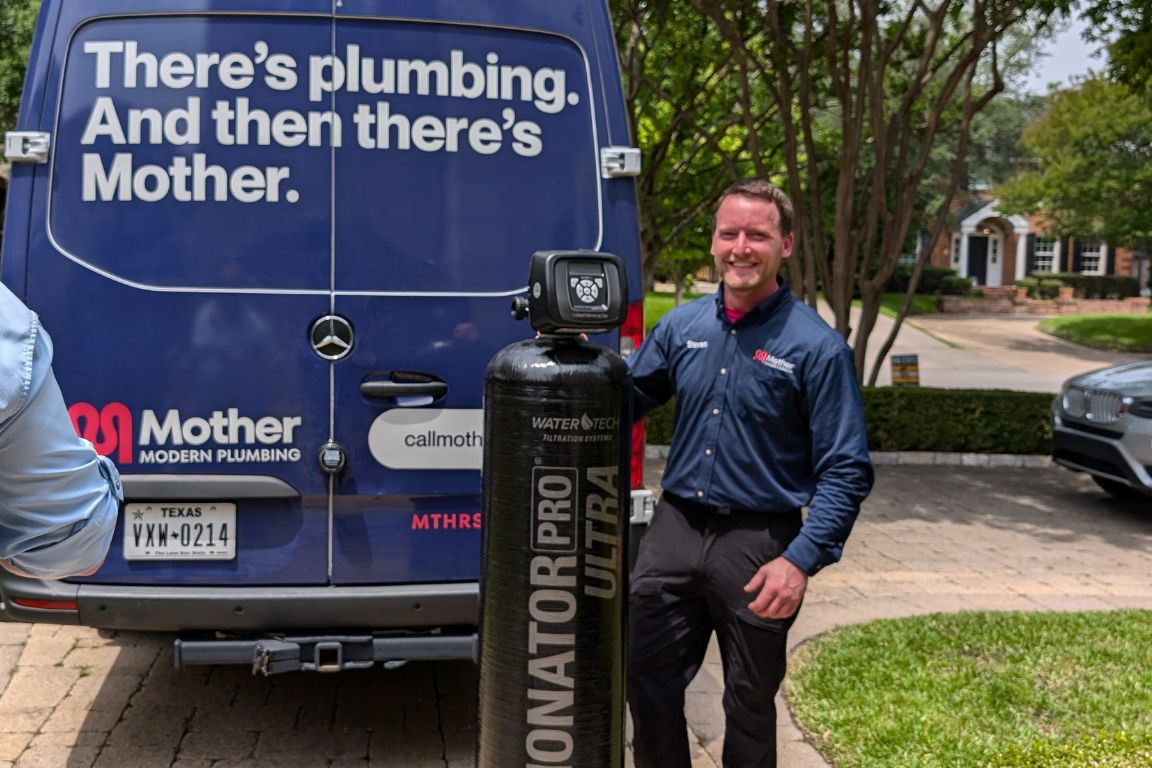
Clean laundry means comfort. Plush towels, your favorite sweater, fresh linens- just because you live in an area with hard water doesn’t mean you don’t deserve them!
Distilled white vinegar in the rinse cycle is a good DIY hack that improves your laundry for the short-term. Homeowners looking for lasting solutions choose between inline water softeners for the washing machine, or whole home softening systems that remove mineral scaling from every faucet, tap and appliance in the house.
Live in Dallas? Call us- we’re here 24/7. We’d love to give you our red carpet service, and show you how soft water makes your laundry- and your life- a lot more comfortable.
{{whole-home-water-softener-installation="/services/whole-home-water-softener-installation"}}
Common Q’s about Water Softeners
What's the difference between a water softener and water conditioner?
Water conditioners alter the way minerals travel through your water, while a water softener system removes hard minerals altogether. They also differ in salt use, their maintenance needs, and their effect on the local environment.
Are all water softeners salt free?
No. The term “salt free water softener” is usually an advertising myth. Virtually all home water softeners use salt in their ion exchange process — a select few products use potassium chloride instead.


